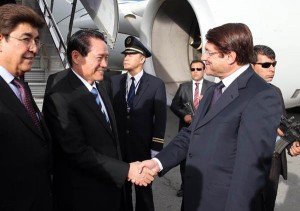Want to read the ultimate hawkish view of the US-China relationship? Read Aaron Friedberg’s recent book, “A Contest for Supremacy.” Throughout the book Friedberg emphasizes that the US-China relationship is inevitably heading down a dark road, that China is forsworn to become a hegemon and direct competitor, and that US policy is currently overweighted on the side of diplomatic engagement rather than military balancing. For a man who wants more balancing, his book is seriously unbalanced. What follows is not so much a review, but a list of grievances, in no particular order. Here’s what’s wrong with the book:
- Underrates internal threats to China’s rise. Friedberg mentions them briefly (demographic problems, impending environmental catastrophe, failing economic models), but doesn’t let them get in the way of predicting a Chinese juggernaut. Friedberg also sketches some possible Chinese futures, concluding that a truculent, hyper-nationalist China is more likely than either the status quo or democratic regime change. Granted, I agree with him that a hyper-nationalist China is more likely than a peaceful democratic China, but a more likely scenario than either is a future where China’s internal problems derail any of the global ambitions he ascribes to it.
- Mistakenly casts Chinese foreign policy thinking as more or less monolithic. Yes, no Chinese political leader currently or will likely in the future call for the demonopolization of the CCP’s power. But beyond that, there is serious political disagreement within the CCP. Economic and political reform are not settled within the party. Neither is foreign policy. The very lack of any coherent grand strategy (which Friedberg mentions) should tell him this.
- Underrates human leadership as making a difference in the US-China relationship. Is foreign policy merely the product of impersonal, historical forces, or can individuals play a role in shaping history? Friedberg seems to believe almost entirely in the former. I think this does not accurately reflect reality. Automatons don’t make foreign policy, human beings do.
- Unnecessarily combative and essentially labels everyone else defeatist appeasers. Seriously, he labels everyone who disagrees with him with these sorts of names. It’s unnecessary, especially because it’s not true. Probably no one he attacks would argue that the US shouldn’t maintain its qualitative military edge; the debate is in how to do this. He derides the idea that Sino-US cooperation can be borne on the back of issues like climate change, trade, etc. Why not? These are legitimately problematic issues, and we need China’s help to solve them, or else we are screwed. He doesn’t even mention climate change in his last chapter.
- Makes assertions about hypotheticals that are ungrounded from reality. Friedberg does this all over the book. The basic model is: what if China becomes a global superpower, projecting force all over the world to secure its interests, while the US de-arms, weakens, and appeases China according to our worst neoconservative fears? These are not credible hypotheticals, and they lead to baseless fear-mongering.
- And finally and most importantly, he underrates the effectiveness of current US policy. Throughout this entire book, Friedberg ascribes no less than the future collapse of all US interests related to China and the Asia Pacific to the Democrats and the current administration’s policies. But Democrats are not the feckless appeasers Friedberg is crudely making them out to be. Of course, just shortly after this book’s publication, the Obama administration announced the pivot/rebalance to Asia. But many of the policy proposals Friedberg advances, including the development of Prompt Global Strike and the Next-Generation Stealth Bomber, have been in the pipeline for a long time. And to be quite honest, the rebalance is not so much a quantitative shift as it is a qualitative shift; the difference is a matter of emphasis, not really a matter of resources. With or without the rebalance, US policy towards China continues a long tradition that has not been upset since the Tiananmen Massacre. It’s worked surprisingly well, and is a sound strategy going into the future.
Friedberg miscalculates both American and Chinese strategy. Engagement and balancing are not goals in of themselves; they are means to an end. That end is a peaceful, strong and rising China that is integrated into the international system. He pays lip service to this, but advocates absolutely zero proposals to make China as it is today more integrated. Everything he proposes is designed to deter the Chinese from overturning America as the global superpower. But this is also a miscalculation of Chinese strategy. China doesn’t want conflict with the US. It’s not building a military that can project force globally. It is developing relatively limited capabilities that would defeat adversaries in a Taiwan conflict and deter an American attack against the mainland. Is this going to change in the future? Very unlikely. China’s integration into the world economy, and its dependence on the US Navy to secure trade and energy shipments, make the calculus fall far in favor of peace and development. Conflict on any mass scale would cause chaos and misery for the Chinese people (think about how current CCP leaders shudder when they hear the words, “Cultural Revolution”). The CCP could very well lose power because of it. And for any foreseeable timeline into the future, the PLA would lose any conflict with the US military. Hands down.
